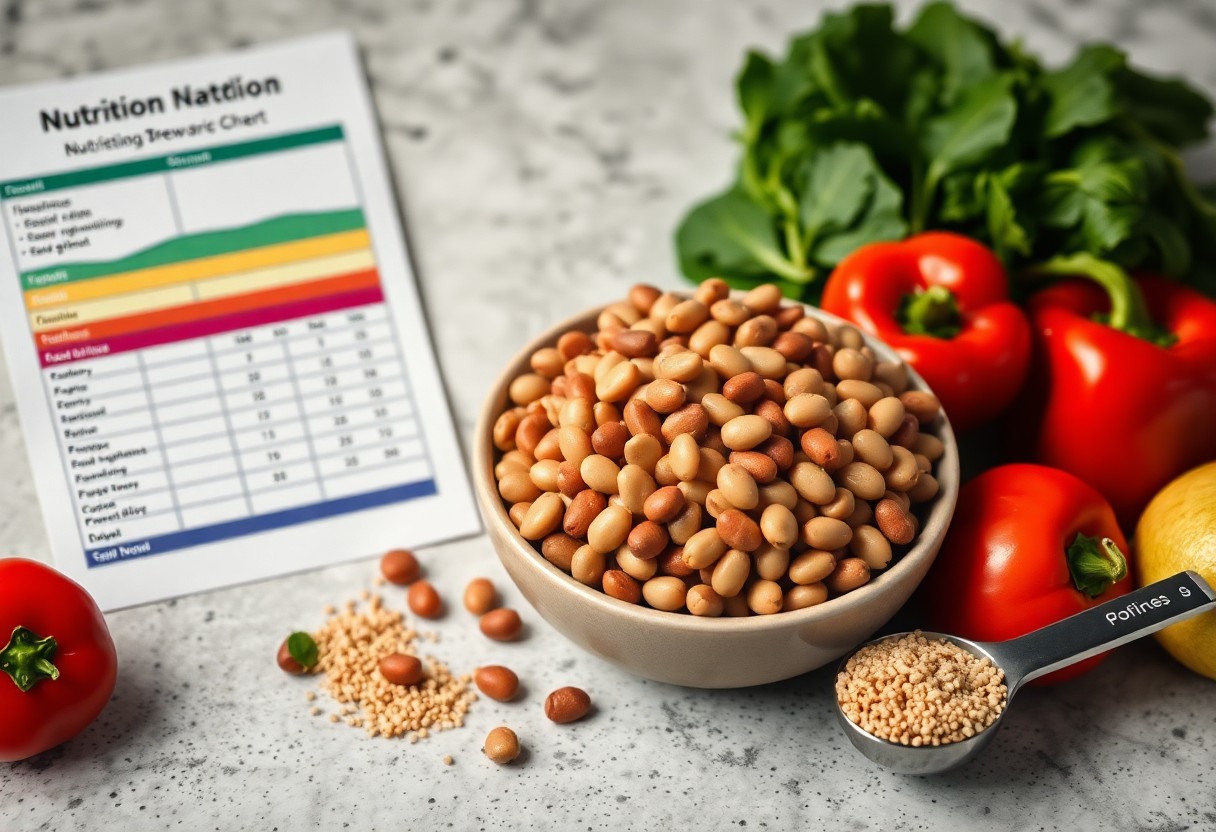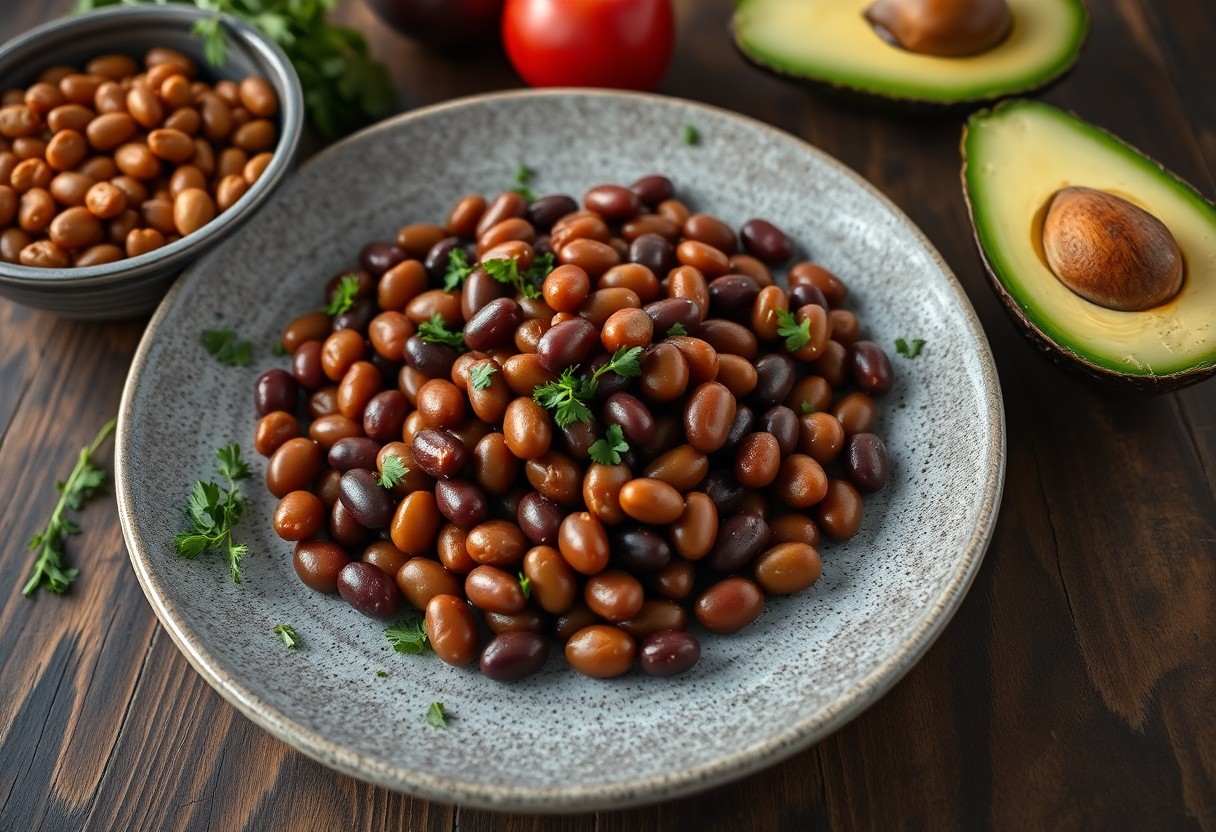There's a wealth of nutritional benefits packed in kidney beans that can enhance your diet. Rich in protein and fiber, these legumes support digestive health and help manage weight. Incorporating kidney beans into your meals not only boosts your nutrient intake but also offers a range of health advantages, including improved heart health and blood sugar regulation. For more insights, check out the 6 Big Benefits of Beans to see how these nutritious foods can fit into your lifestyle.

Key Takeaways:
- Kidney beans are an excellent source of plant-based protein, making them ideal for vegetarians and vegans.
- High in dietary fiber, kidney beans promote digestive health and can aid in weight management.
- Incorporating kidney beans into your diet may help reduce the risk of chronic diseases, including heart disease and diabetes.
Nutritional Profile of Kidney Beans
The nutritional profile of kidney beans is impressive, offering a variety of crucial vitamins and minerals. A one-cup serving of cooked kidney beans provides approximately 225 calories, 15 grams of protein, 13.1 grams of fiber, and a rich assortment of micronutrients, including iron, potassium, and magnesium. This unique nutrient composition makes them a smart choice for enhancing your overall health, especially in plant-based diets.
Protein Content
Kidney beans are a notable source of plant-based protein, delivering about 15 grams per cooked cup. This makes them an excellent choice for vegetarians and vegans aiming to meet their protein requirements. The protein in kidney beans contains crucial amino acids, supporting muscle repair and overall bodily functions.
Fiber Content
A single cup of cooked kidney beans provides an impressive 13.1 grams of dietary fiber, which significantly contributes to your daily intake. This fiber aids digestion, promotes a feeling of fullness, and supports heart health by helping to regulate cholesterol levels.
Incorporating kidney beans into your diet can substantially boost your fiber intake, enhancing digestive health. The soluble fiber in kidney beans slows digestion, stabilizes blood sugar levels, and aids in cholesterol reduction. Furthermore, fiber is crucial for maintaining a healthy gut microbiome, which plays a critical role in overall health. Regular consumption of fiber-rich foods, like kidney beans, has been linked to a lower risk of chronic diseases, making them an invaluable addition to your meals.
Health Benefits of Kidney Beans
Including kidney beans in your diet offers numerous health benefits. Rich in protein, fiber, and imperative nutrients, they can support heart health, improve digestion, and help maintain a healthy weight. For more on the health benefits, check out Are Kidney Beans Healthy? Here's What a Dietitian Has to ....
Heart Health
Your heart can greatly benefit from the consumption of kidney beans. They are known to lower cholesterol levels, which helps reduce the risk of heart disease. The fiber content aids in maintaining healthy blood pressure, while the presence of antioxidants supports overall cardiovascular health.
Blood Sugar Regulation
Kidney beans play a vital role in regulating blood sugar levels, making them an excellent choice for those managing diabetes. The high fiber content slows down the absorption of sugar in the bloodstream, preventing spikes in glucose levels. This can help you maintain stable energy levels throughout the day, reducing cravings and promoting better overall health.
The glycemic index of kidney beans is low, which means they have a minimal impact on blood sugar levels compared to high-glycemic foods. Studies show that incorporating legumes like kidney beans into your meals can lead to improved glycemic control, making them a strategic choice for those with insulin resistance or type 2 diabetes. Regular consumption may also contribute to better overall metabolic health, supporting your efforts to manage blood sugar effectively.Incorporating Kidney Beans into Your Diet
Adding kidney beans to your diet can be simple and rewarding. They are versatile and can complement a variety of dishes, making it easy to boost your nutrition. Aim to incorporate them two to three times a week for optimal health benefits. You can toss them into salads, soups, or stews, or mash them for spreads. Experimenting with different cuisines, like Mexican or Indian, can help you enjoy their rich flavors while maximizing their nutritional value.
Cooking Methods
Kidney beans can be prepared through various cooking methods. Boiling is the most common approach; soak dried beans overnight, then cook them in fresh water for about an hour. Canned beans offer convenience; simply rinse and add them to your dishes. Other methods, like slow cooking or pressure cooking, can also yield tender results while enhancing flavors. Each method ensures that the beans retain their nutritional benefits and rich texture.
Recipe Ideas
Explore multiple recipe ideas to make the most of kidney beans in your meals. Consider creating a hearty chili, which blends kidney beans with vegetables and spices for a satisfying dish. You can also make a bean salad with fresh greens, tomatoes, and a zesty dressing. For a quick snack, try making bean dip, perfect for pairing with vegetable sticks or whole-grain chips. Each of these options showcases the versatility and taste of kidney beans while helping you maintain a balanced diet.
To elevate your culinary experience, consider trying a vegetarian chili loaded with kidney beans, bell peppers, and spices like cumin and chili powder for warmth. A refreshing three-bean salad incorporating kidney beans, black beans, and garbanzo beans, dressed with a light vinaigrette, makes a perfect side dish. You can even create a filling burrito with kidney beans, avocado, and salsa wrapped in whole-grain tortillas. These recipes not only provide a wealth of nutrients but also highlight how easily kidney beans can be integrated into diverse meals.
Comparing Kidney Beans to Other Legumes
Analyzing kidney beans alongside other legumes reveals their unique nutritional profile and benefits. Each legume type offers distinct advantages, making them valuable additions to your diet. Below is a comparison considering protein content, fiber, and other nutrients.
Nutritional Comparison| Legume | Protein (g per 100g) |
|---|---|
| Kidney Beans | 8.7 |
| Chickpeas | 8.9 |
| Black Beans | 8.9 |
| Lentils | 9.0 |
Culinary Uses
Kidney beans are incredibly versatile in the kitchen, enhancing various dishes with their robust flavor and hearty texture. You can incorporate them into chili, salads, soups, and stews, or use them as a meat substitute in vegetarian meals. Their ability to absorb spices allows for a multitude of culinary possibilities, making them a favorite in cuisines worldwide.
In addition to standard uses, kidney beans can be blended into dips, added to grain bowls, or combined with rice for a nutritious filling. You might also experiment with them in veggie burgers or blended into smoothies for added protein and fiber. This adaptability means you can enjoy kidney beans in both traditional recipes and modern culinary innovations, enriching your meals while boosting their nutritional value.

Potential Risks and Considerations
While kidney beans offer significant health benefits, certain risks and considerations should not be overlooked. They contain anti-nutrients and may provoke allergies or sensitivities in some individuals. Cooking practices play a vital role in mitigating these risks, ensuring that you can enjoy the nutritional advantages without adverse effects.
Anti-Nutrients
Kidney beans contain anti-nutrients like lectins and phytic acid, which can hinder nutrient absorption and interfere with digestion if consumed in raw or undercooked forms. Soaking and cooking beans properly can significantly reduce these compounds, allowing you to reap the benefits of their nutrient-rich profile.
Allergies and Sensitivities
Some individuals may experience allergic reactions or sensitivities to kidney beans, which can manifest as digestive discomfort or rash. While not highly common, these reactions can vary in severity and require attention to dietary choices.
Allergic reactions to kidney beans may arise from specific proteins found within the beans, with symptoms ranging from mild gastrointestinal distress to severe anaphylaxis in rare cases. If you have a history of legume allergies or experience adverse symptoms after consuming kidney beans, seeking medical advice is advisable. Identifying and managing these sensitivities enables you to enjoy a diverse diet while prioritizing your health and well-being.
To wrap up
Upon reflecting, incorporating kidney beans into your diet can significantly enhance your nutritional intake with their high protein and fiber content. By adding beans, you not only support your health with important nutrients, but you also contribute to better digestive health and weight management. To learn more about the benefits of beans, explore this resource on Power-packed Proteins All About Beans, which will guide you in making informed dietary choices.
Kidney Beans Nutrition - Protein, Fiber, and Health Benefits of Adding Beans to Your Diet
Q: What nutritional value do kidney beans provide?
A: Kidney beans are high in protein, providing about 15 grams per cooked cup. They are also rich in dietary fiber, with around 13 grams per cup, and are a good source of necessary minerals like iron, magnesium, and potassium.
Q: How do kidney beans support digestive health?
A: The high fiber content in kidney beans promotes healthy digestion by aiding bowel regularity and helping to prevent constipation. Fiber also supports a healthy gut microbiome.
Q: Can kidney beans help with weight management?
A: Yes, kidney beans can aid in weight management due to their high protein and fiber content. Both nutrients increase satiety and help control appetite, making it easier to maintain a healthy weight.
Q: What health benefits are associated with eating kidney beans?
A: Consuming kidney beans may lower the risk of chronic diseases, including heart disease and diabetes. Their fiber content can help regulate blood sugar levels, while antioxidants in beans may reduce inflammation.
Q: How can kidney beans be incorporated into a diet?
A: Kidney beans can be added to salads, soups, stews, and chili. They can also be blended into dips, or served as a side dish, providing versatility in meal planning.

0 Comments